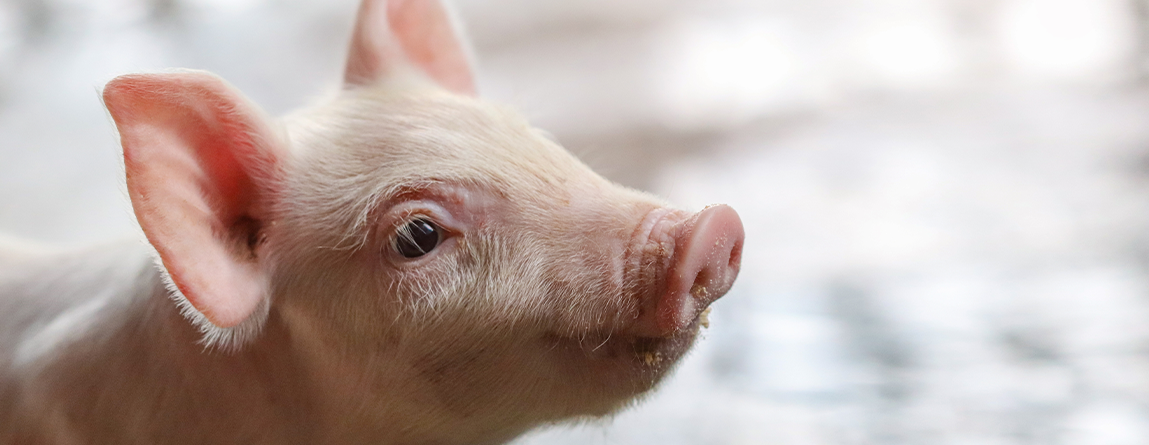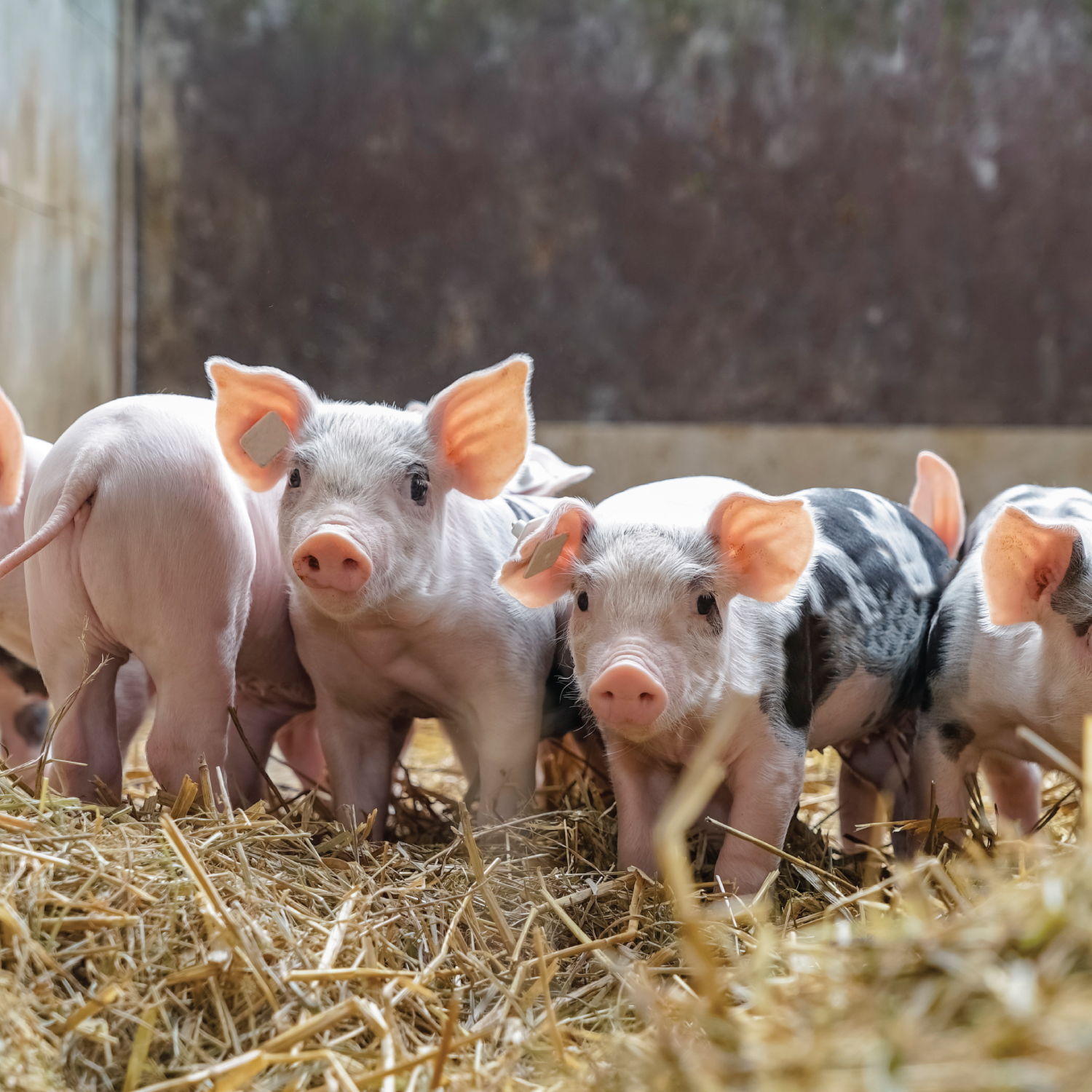
SWINE
FIND THE BEST SOLUTION

Coccidiosis in piglets
Coccidiosis in pigs is caused by parasitic protozoa of the Eucoccidiorida order, belonging to the Eimeriidae or Cryptosporidiidae families, which multiply inside the cells of the host’s digestive tract. The disease is caused by three types of coccidia: Eimeria, Isospora and Cryptosporidium.
The Eimeria genus is most common in weaned piglets, fattening pigs and gilts. Two predominant species of Cryptosporidium are: C. suis, dominant in piglets before weaning, and C. scrofarum specific to fattening pigs and adult pigs. The most dangerous and common piglet-specific protozoan strain is Isospora suis.
Coccidiosis caused by Isospora suis is a disease typical for suckling piglets. Piglets are exposed to coccidia infection from birth. Infection occurs soon after birth, through ingestion of an invasive oocyst picked out from the environment, which develops inside the body during the time as short as 5-7 days. The determining factor in the outcome of infection is the age of the animals. The younger the piglets are the more susceptible they are. In most cases, coccidiosis is manifested with diarrhea appearing between 7 and 15 days of age. As the condition develops, there are characteristic changes in the consistency and color of the feces, which become creamy, yellowish and watery and, sometimes foamy. And in connection with this, there is a deterioration in the general condition of the animals, which, despite intensive suckling of milk, are dehydrated, weak and skinny.
It is worth noting that usually the disease does not directly cause mortality. Part of the litter may undergo coccidiosis symptomatically, and the rest asymptomatically. On the other hand, it is a disease that at a later stage generates prolonging the cycle of fattening due to slowedr growth rate, reduced body weight and high susceptibility to secondary infections of piglets.

Coccidia have a devastating effect on the digestive system of animals. They lead to degeneration of intestinal villi and damage to intestinal epithelial cells. In addition, they lead to a weakening of the entire organism, which is associated with reduced immunity and increased susceptibility to bacterial infections. The combination of these factors results in poorer feed converttion, poor weight gain, and increases mortality. Prolongation of the rearing and fattening period is also a big issue for the farmer, as well as the cost of treating animals, and thus the profitability of pig production.
Treatment and prevention of coccidiosis, as well as the use of antibiotics, became a necessity as animal production massively intensified. However, the extensive use of chemotherapeutics has became the cause of a significant increase in the build-up of microbial resistance to antibiotics, which has made them ineffective in the treatment of humans and animals. Such action has also led to the occurrence of dysbacteriosis, which has a very negative impact on animal health and growth.
The positive role of antibiotics in the treatment of animals and humans is unquestionable. However, in order for them to remain effective in situations of utmost necessity, they should not be used universally.
Coccidia have a devastating effect on the digestive system of animals. They lead to degeneration of intestinal villi and damage to intestinal epithelial cells. In addition, they lead to a weakening of the entire organism, which is associated with reduced immunity and increased susceptibility to bacterial infections. The combination of these factors results in poorer feed converttion, poor weight gain, and increases mortality. Prolongation of the rearing and fattening period is also a big issue for the farmer, as well as the cost of treating animals, and thus the profitability of pig production.
Treatment and prevention of coccidiosis, as well as the use of antibiotics, became a necessity as animal production massively intensified. However, the extensive use of chemotherapeutics has became the cause of a significant increase in the build-up of microbial resistance to antibiotics, which has made them ineffective in the treatment of humans and animals. Such action has also led to the occurrence of dysbacteriosis, which has a very negative impact on animal health and growth.
The positive role of antibiotics in the treatment of animals and humans is unquestionable. However, in order for them to remain effective in situations of utmost necessity, they should not be used universally.
Bibliography:
- Stuart Barry P., Lindsay D. S.; Coccidiosis in Swine; Veterinary Clinics of North America: Food Animal Practice-Vol. 2, 2, 1986, 455.
- Ruzicka Christopher W., Andrews J. J.; Porcine Neonatal Coccidiosis: A Clinical Review; Iowa State Veterinarian, Vbl. 45, 1984, No.2, 90-95.
- Chen Y., Qin H., Wu Y., Xu H., Huang J., Li J., Zhang L.; Global prevalence of Cryptosporidium spp. in pigs: a systematic review and meta-analysis; Parasitology 2023,150, 531–544.
- Karamon J., Sroka J., Cencek T.; Inwazja kokcydiów Isospora suis u prosiąt – wciąż aktualny problem; Życie Weterynaryjne, 2009, 84(4), 308-311.
- Pejsak Z., Truszczyński M.; Biegunki prosiąt ssących i odsadzonych; Życie Weterynaryjne, 2005, 80(3), 151-154.
- Jacobson M.; On the Infectious Causes of Neonatal Piglet Diarrhoea—A Review; Vet. Sci. 2022, 9, 422.
- Gheisar M. M., Kim I. H.; Phytobiotics in poultry and swine nutrition – a review, Italian Journal of Animal Science, 2018, 17:1, 92-99.
- Harleman J. H., Meyer R. C.; Isospora suis infection in piglets. A review, Veterinary Quarterly, 1983,5:4, 178-185.
- Parsonage B, Hagglund P.K., Keogh L., Wheelhouse N., Brown R.E., Dancer S.J.; Control of Antimicrobial Resistance Requires
an Ethical Approach; Front. Microbiol 2017. 8:2124.


